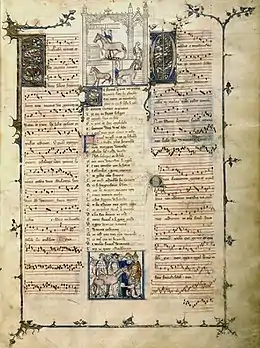Magister Franciscus
Magister Franciscus (fl. 1370–80) was a French composer in the ars nova style of late Medieval music. He is known for two surviving works, the three-part ballades: De Narcissus and Phiton, Phiton, beste tres venimeuse. The former was widely distributed in his lifetime.[1]
Identity
Franciscus may be the same person as the F. Andrieu who wrote Armes, amours/O flour des flours, a déploration on the death of poet-composer Guillaume de Machaut (c. 1300–1377).[2] Although, the scholarly consensus on this identification is unclear.[n 1] He may also be Franciscus de Goano or Johannes Franchois.[1] Machaut was the most dominate and important composer of the 14th century,[3] and Franciscus's works show many similarities to his, suggesting the two were contemporaries.[1]
Music
Only two of his works survive, the three-part ballades: De Narcissus and Phiton, Phiton, beste tres venimeuse.[1] They are both contained in the Chantilly Codex.[4] Reaney notes that Magister Franciscus's works are likely earlier than Andrieu's, between 1370 and 1376.[5]
Works
| Title | No. of voices | Genre | Manuscript source: Folios | Apel | Greene |
|---|---|---|---|---|---|
| De Narcissus | 3 | Ballade | Chantilly Codex: 19v | A 26 | G Vol 18: 16 |
| Phiton, Phiton, beste tres venimeuse | 3 | Ballade | Chantilly Codex: 20v | A 27 | G Vol 18: 18 |
| No other works by Magister Franciscus survive[n 2] | |||||
Editions
Franciscus's works are included in the following collections:
- Apel, Willi, ed. (1970–72). French Secular Compositions of the Fourteenth Century. Corpus mensurabilis musicae. 53. Cambridge, Massachusetts: American Institute of Musicology. ISBN 9780910956291. OCLC 311424615.
- Greene, Gordon K., ed. (1982). Manuscript Chantilly, Musée Condé 564 Part 1, nos. 1–50. Polyphonic Music of the Fourteenth Century. 18. Monaco: Éditions de l'Oiseau-Lyre. OCLC 181660103.
Notes
- Scholars identify F. Andrieu as Magister Franciscus with varying degrees of certainty:
- Reaney 2001: Their works being from the same manuscript "suggest that the two composers may be the same person".
- Abraham & Hughes 1960, p. 27: "Franciscus is doubtless the same man as the F. Andrieu..."
- Reaney 1954, p. 67: "It would not be impossible for Magister Franciscus and F. Andrieu to be one and the same person"
- Günther 2001: "[Magister Franciscus] may be the F. Andrieu..."
- Strohm 2005, p. 53: "[F. Andrieu] may be the same man as Magister Franciscus"
- Magnan 1993, p. 49: "[On the identification between Andrieu and Franciscus] this tenuous identification leads nowhere."
- If Magister Franciscus is identifiable with F. Andrieu, then Andrieu's compositions would be his as well.
References
- Günther 2001.
- Reaney 2001.
- Reese 1940, p. 359.
- Abraham & Hughes 1960, p. 27.
- Reaney 1954, p. 67.
Sources
- Books
- Abraham, Gerald; Hughes, Dom Anselm, eds. (1960). Ars Nova and the Renaissance 1300-1540. The New Oxford History of Music. III. Oxford, England: Oxford University Press. ISBN 978-0-19-316303-4.
- Reese, Gustave (1940). Music in the Middle Ages: With an Introduction on the Music of Ancient Times. Lanham, Maryland: W. W. Norton & Company. ISBN 978-0-393-09750-4.
- Strohm, Reinhard (2005). The Rise of European Music, 1380-1500. Cambridge, England: Cambridge University Press. ISBN 978-0-521-61934-9.
- Journals and articles
- Günther, Ursula (2001). "Franciscus, Magister". Grove Music Online. Oxford, England: Oxford University Press. doi:10.1093/gmo/9781561592630.article.10117. (subscription or UK public library membership required)
- Magnan, Robert (1993). "Eustache Deschamps and his Double: Musique naturele and musique artificiele". Ars Lyrica. New Haven Connetictut: Brepols. 7: 47–64. eISSN 2507-0398. ISSN 1043-3848.
- Reaney, Gilbert (1954). "The Manuscript Chantilly, Musée Condé 1047". Musica Disciplina. 8: 59–113. JSTOR 20531876.
- Reaney, Gilbert (2001). "Andrieu, F.". Grove Music Online. Oxford, England: Oxford University Press. doi:10.1093/gmo/9781561592630.article.00904. (subscription or UK public library membership required)
- Wilkins, Nigel (1968). "The Post-Machaut Generation of Poet-Musicians". Nottingham Medieval Studies. Turnhout, Belgium: Brepols. 12: 40–84. doi:10.1484/J.NMS.3.38.
External links
- List of compositions by Magister Franciscus at the Digital Image Archive of Medieval Music
- Works by Magister Franciscus in the Medieval Music Database from La Trobe University
